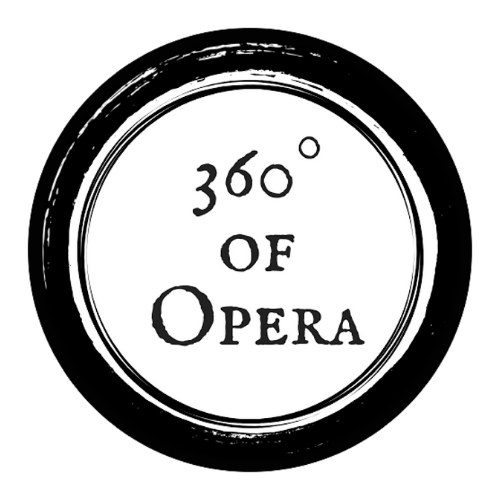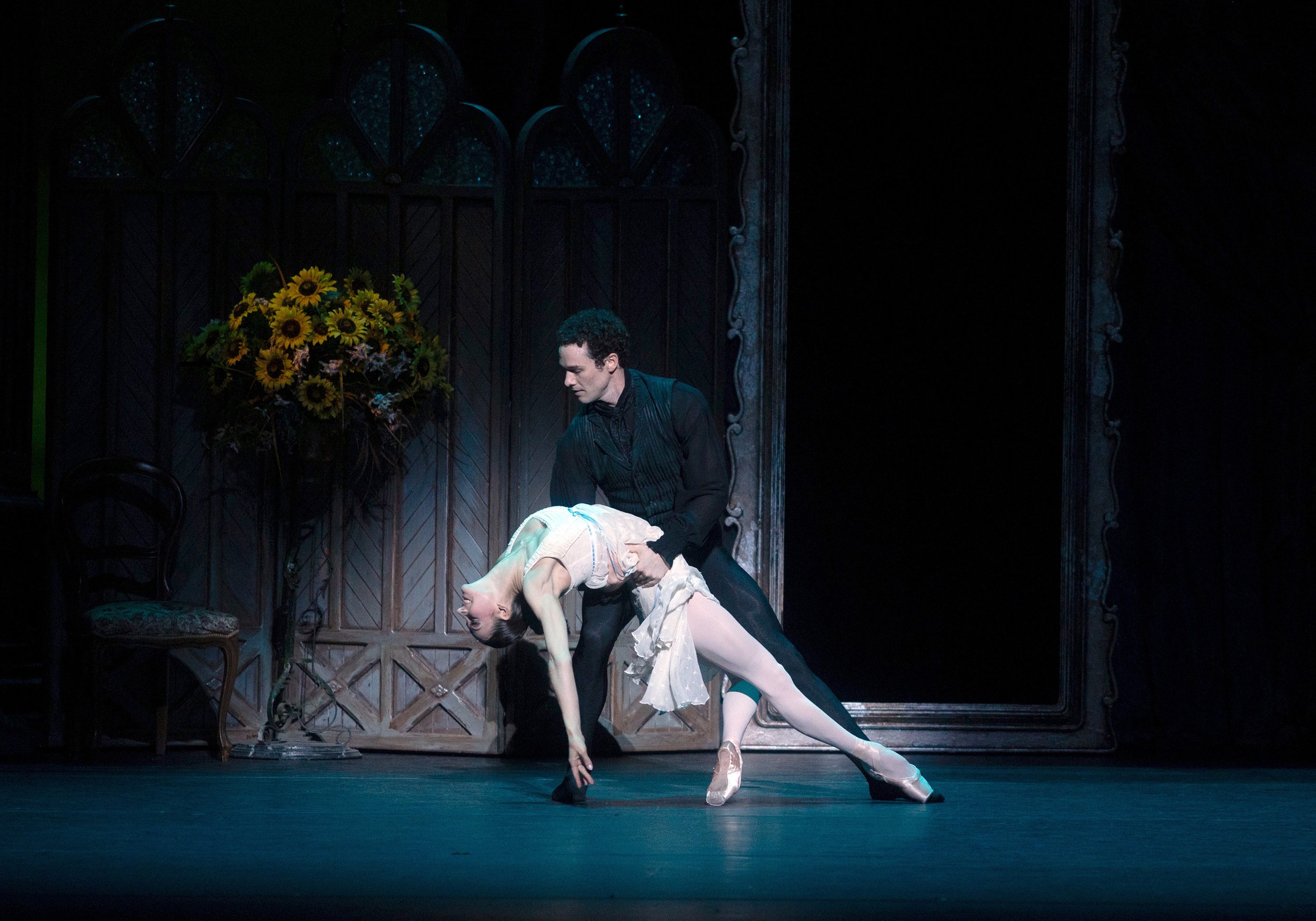ABT 2024: Onegin
Zimmi Coker and Jake Roxander in Onegin. Photo: Rosalie O’Connor.
On June 18, 2024, American Ballet Theater kicked off their summer season with John Cranko's 'Onegin'. This balletic adaptation of Pushkin's work was beautifully staged and rapturously embodied by the talents of the dancers that evening, making for an unforgettable experience. Leading the orchestra this evening was Charles Barker, who drew surprising amounts of color and passion from Tchaikovsky’s score which balanced sentiment and energy.
Having been introduced to the work through the 2017 Stuttgart Ballet production, it was a wonderful surprise for me to see how the set and staging have changed since. Scenes at Madame Larina's such as the opening and Tatiana's birthday party were staged in the bright, outdoor gardens, the latter instance including a bevy of flowers to adorn the art deco-esque frames. Among these changes was the layout of Tatiana's bedroom for the letter scene, where the mirror takes a greater prominence in its center-stage position, becoming like a portal into the dream sequence which soon unfolds with nothing short of magic.
In the role of Olga, Zimmi Coker often shone in the forefront of the scenes and dances, her bubbly energy was a constant source of charm as she either played with Tatiana or engaged in flirtations with Lensky. This sweet sense of ardor saw great expression in their Act 1 pas de deux, as their chemistry bestowed a greater charge to the refined measures from the strings and orchestra during the andante, featuring a series of elegant rolls over her partner's back as one seemed to swing about the other in the romantic current.
Her appearances through the numbers of Tatiana’s party started with a jubilance, and even childishness, which supported how easily Onegin was able to lure her into a game of cards before stealing her away from Lensky. Whereas some portrayals have her emphasize wanting to punish Lensky's suspicions, this Olga gave the sense of a joke simply being taken too far.
As Lensky, Jake Roxander made for a wonderfully passionate showing through his solo moments, as well as a stunning compliment to Coker's Olga. His opening number featured great control and expression as seen from his soft, graceful leaps as he toured the stage, flowing seamlessly into turns or deft cabrioles. His sense of support was finely demonstrated through a string of alternating lifts, as he carries her pendulously downstage, to pivot into a gorgeous, closing reverence as he embraces Olga.
These qualities made the drama all the more savory when their relationship hits rocky ground in the later scenes, where Olga's pleading is constantly rebuffed. His solo before his fateful duel was a breathtaking contrast to the earlier joyfulness, as his turmoil seemed to weigh on his moves, causing his pirouettes to taper sadly, bringing forth searching turns as he pivoted on his heels, or the way his kneeling frame was nearly bent backwards into a bridge position.
Christine Shevchenko and Cory Stearns in Onegin. Photo: Rosalie O’Connor.
In the role of Tatiana, Christine Shevchenko was a revelation. After her fateful meeting with Onegin, this wallflower soon blossomed into one of great beauty; during her initial duet with him, there was a fine sense of establishing their interpersonal limitations as she seemed to demure from his lead before resigning herself to watch with heartache. This was contrasted to stunning effect for the letter scene, where her infatuations were explored to intoxicating heights as the context of the dream beautifully conveyed the richness of Tatiana's inner world. Through the difficult choreography, Schevchenko displayed a wealth of artistic sense and athletic ability which simply must be experienced firsthand.
Her solo during her birthday party carried with a bashful charm as she had to fight against her own insecurities before showing some elegant leaps and piqué steps. This moment provided an instance where she could mostly exist on her own, before being startled off by Onegin. In her dance with Roman Zhurbin's Prince Gremin, the chemistry between the two spoke to a sense of inner peace that had eluded the character for so long, and it was satisfying to see Tatiana treated so regally through the gentle carries and their overlapping port de bras. Her final moments with Onegin was pure, anguished magic as the two attempted to recreate the wonder of the letter scene's sequence despite the crushing emotions weighing them down and tingingthe orchestral texture with heartbreak.
In the title role, Cory Stearns brought an abundance of dramatic nuance and physical prowess to flesh the character out to splendid effect, and was himself no less stunning than Shevchenko. His participation in social customs such as the opening mirror game or his entrance at Tatiana’s party suggested an openness of heart which later proves to be false. His initial number with Tatiana carried with courtesy before his attention turned elsewhere, resulting in some silky yet laconic pirouettes, with a noted swoon which spoke volumes to his Byronic nature.
Constantly refined down to the measure of his steps, Stearns conveyed much through not just his mastery of the choreography, but through the subtler gestures and expressions in calmer moments or through the closings of scenes, where the veil of the set provided a distance which allowed Onegin to either comment on the preceding events, or be swept away by painful memories. These aspects were taken to tantalizing heights with the sequence at the palace, where the corps of women seem to haunt his every turn as he lifts the specters away.
Christine Shevchenko and Cory Stearns in Onegin. Photo: Rosalie O’Connor.
While the talents of the principal dancers were on full display this evening, the corps also dazzled through the plentiful ensemble numbers, featuring moments such as the Act 1 folk dance which drives along with a pastoral verve to close with a parade of running jetés, or the utter refinement of the Act 2 dance at the palace as the women are borne along as light as feathers. Their presence is also an important aspect of this work which so emphasizes public appearances/perceptions, lending credence to moments where Onegin's actions can truly cast ripple through the social circles.
Tuesday's performance was one for the ages, with the score and dancing coming together to form an absolutely captivating tapestry of drama, and with too many gorgeous moments to fully recount. Following such a dazzling performance, the rest of the summer season is indeed looking bright for American Ballet Theater.
Following the performance, a reception was held at the Metropolitan Opera's Grand Tier to welcome incoming Executive Director Barry Hughson. A lifelong proponent of the arts, he has held leading positions with companies such as Boston Ballet, and served as Executive Director of The National Ballet of Canada as well as President of their Endowment Foundation.
“This was a very exciting night for American Ballet Theater, as we begin the season, and it’s also really a special night for me. I want you all to take a moment to think about your ‘ABT origin story’. Some of you may be here for the very first time, many of you have been part of this company for decades. My origin story with ABT started when I was about 10 years old and I was in love with Mikhail Baryshnikov. I spent hours trying to understand how he defied gravity; as a 10 year-old ballet student, he was my guiding star. He made me fall in love with this art form. As a professional dancer I had the opportunity to be mentored by some ABT luminaries, and these people were instrumental in my development as a young artist, and fast-forward to today, I’m here to partner with Susan Jaffe and all of you to make sure ABT reaches its 100th birthday and far, far beyond. I’m very excited to be here, I think it’s important to recognize that it’s a difficult time for the arts in this country.
The government has never funded the arts properly, and it really falls on philanthropy to make all this possible. Tonight we saw a glorious production. These dancers dedicate their lives to the craft, and so our investment in American Ballet Theater is an investment in each of them, giving them a platform to do what they do. What I want to say to close without getting emotional is that these are pretty dark times right now, but what American Ballet Theater and the arts bring to our society is light. We bring a shared human experience. We bring truth, we bring beauty, and we bring joy, and that is the investment that you make by supporting this company each and every day, and I think you, Susan thanks you, and all of the artists from the past and into the future thank you.”
-written by Logan Martell




